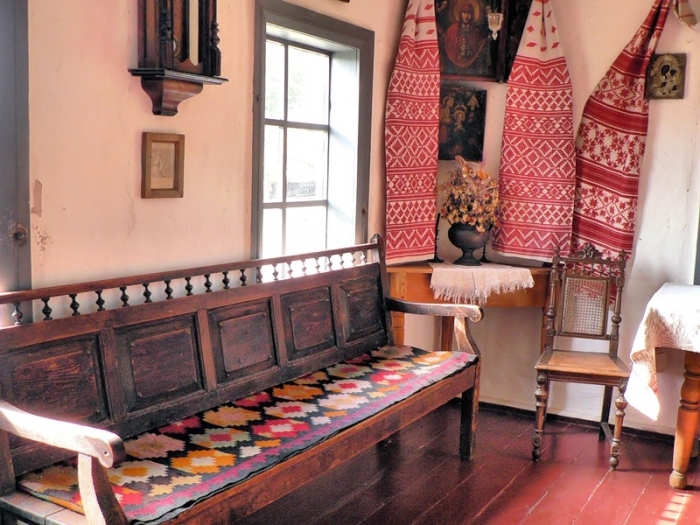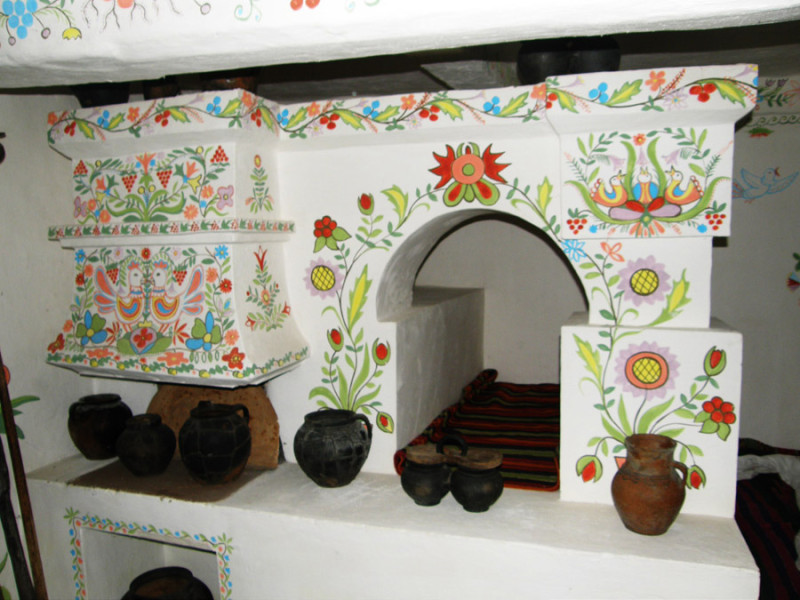 At one time, at the turn of the century, all of Ukraine was under the influence of the Feng Shui movement. A multitude of all kinds of shops with an assortment of Chinese symbols appeared, which were supposed to help in solving a wide variety of everyday problems, work or personal affairs. Ethnographer Yana Yakovenko wondered at that time whether there was an analogue of such assistants and trends in our culture, because our ancestors also very carefully monitored their housing. And what finally prompted the ethnographer to follow the tradition in more detail was a conversation with one woman who was a fan of Feng Shui. When the researcher was walking with a large prickly acacia branch, she gave her advice on where exactly to put this branch so that it would drive away evil. But the researcher's own opinion did not coincide with this advice, because in the Slavic tradition the same action looked completely different. Everyone stood by their opinion, but can a foreign tradition or ritual have the same consequences and meaning in another country? And will a simple rearrangement of things in your home help bring happiness and harmony to it, even if you have a book on feng shui at home?
At one time, at the turn of the century, all of Ukraine was under the influence of the Feng Shui movement. A multitude of all kinds of shops with an assortment of Chinese symbols appeared, which were supposed to help in solving a wide variety of everyday problems, work or personal affairs. Ethnographer Yana Yakovenko wondered at that time whether there was an analogue of such assistants and trends in our culture, because our ancestors also very carefully monitored their housing. And what finally prompted the ethnographer to follow the tradition in more detail was a conversation with one woman who was a fan of Feng Shui. When the researcher was walking with a large prickly acacia branch, she gave her advice on where exactly to put this branch so that it would drive away evil. But the researcher's own opinion did not coincide with this advice, because in the Slavic tradition the same action looked completely different. Everyone stood by their opinion, but can a foreign tradition or ritual have the same consequences and meaning in another country? And will a simple rearrangement of things in your home help bring happiness and harmony to it, even if you have a book on feng shui at home?
The ethnographer traveled a lot through villages, spent a lot of time in libraries reading books, which gave her the opportunity to draw conclusions: among our ancestors, each thing always had its place, its meaning, and there were reasons for it. For example, the researcher often mentioned her grandfather's house, which was located in Hulyaipol, in the Zaporizhia region. Later, while processing the collected materials, Yana noticed that in his house things occupied exactly the places that were indicated in these materials. And then the researcher realized that the culture of the people cannot but depend on the land where they live, which is their native land. Land, nature, weather, animal and plant life, mountains - all this forms the culture of a person, his worldview, his beliefs and preferences.  And there are no identical values for people of different cultures and lands. The good of some can become the misfortune of others. Even water, which is the source of life, is valued as such in deserts, where it is rare, and in swampy lands, for example, water can be the cause of death. The same with feng shui: for China it is a pearl, but for us not all its ideas will be apt. So, first of all, we need to think about our roots and native land, rather than imagining foreign rituals without thinking,” concluded Yana Yakovenko.
And there are no identical values for people of different cultures and lands. The good of some can become the misfortune of others. Even water, which is the source of life, is valued as such in deserts, where it is rare, and in swampy lands, for example, water can be the cause of death. The same with feng shui: for China it is a pearl, but for us not all its ideas will be apt. So, first of all, we need to think about our roots and native land, rather than imagining foreign rituals without thinking,” concluded Yana Yakovenko.
Ukrainians are now very proud of their roots and remind their neighbors of what a proud nation they belong to. However, the question "What exactly does it mean to be Ukrainian?" - not every one of them will give an answer so easily. In general, a nation can be considered a certain community of people who find their character through the common fate they have. Just as each person has their own DNA, so the nation has its own unique code, which can be deciphered through fairy tales, songs, culture, and amulets. And today we would like to dwell on the initial concepts of feng shui, but specifically Ukrainian. And Yana Yakovenko will help us understand this today.
 The tradition of placing objects in a home to harmonize energies undoubtedly came from China, but its laws work both there and here, simply taking into account a different land, Ms. Yana believes. It is not about material prosperity, but about the land on which we live, on which the Chinese live, the land whose energy and chemistry affect us. After all, we are children of nature, the land, and accordingly its laws affect us and our lives. And they are encoded in rites and rituals that generations pass on to each other.
The tradition of placing objects in a home to harmonize energies undoubtedly came from China, but its laws work both there and here, simply taking into account a different land, Ms. Yana believes. It is not about material prosperity, but about the land on which we live, on which the Chinese live, the land whose energy and chemistry affect us. After all, we are children of nature, the land, and accordingly its laws affect us and our lives. And they are encoded in rites and rituals that generations pass on to each other.
The placement of houses and objects in a house has been unchanged and regular in Ukraine for a long time. We may not know for sure about all the existing rules and laws, but at the level of intuition we do it exactly as history has laid down in us. Yana Yakovenko gives an example of how, without knowing for sure, she put an iron in her apartment instead of a stove (which, of course, cannot be in a city apartment), and this turned out to be a zone of fire that must be controlled. And the understanding of this did not come immediately, but over time. Yana pondered for a very long time how exactly one could mark the place of the stove in the house, and none of the options suited her. But only chance led to the understanding that it is the iron that organically and correctly fits into the interior, arranging everything in its places and zones. Maybe intuition is our code that we use without realizing it? And the more subtly a person feels the vibrations of the earth, the more carefully and attentively he listens to them, the easier his life becomes, the more peace and harmony it has. And our ancestors speak to us through the vibrations of the earth, the ethnographer believes.
The power of amulets
 Feng Shui in Ukraine began with housewarmings. Usually, a rooster was first let into the house, and a white one, because it has long symbolized the sun. A white rooster consecrated the house. According to an older tradition, the first to enter the house was… you would never guess – a horse! The head of the family followed him, and then he pulled all the relatives over the threshold with a rope. Another tradition also originated from this tradition – when the newlyweds take hold of the edge of a towel, and then they are led into the new house, and the oldest woman in the family sprinkles grain on everyone. After the ceremony was held in the new house, a rooster or cat was left there. It was customary to slaughter a pig or a ram for housewarmings. And what is interesting, not all relatives were allowed to enter all the rooms of the new house – only the father could do this without violating traditions.
Feng Shui in Ukraine began with housewarmings. Usually, a rooster was first let into the house, and a white one, because it has long symbolized the sun. A white rooster consecrated the house. According to an older tradition, the first to enter the house was… you would never guess – a horse! The head of the family followed him, and then he pulled all the relatives over the threshold with a rope. Another tradition also originated from this tradition – when the newlyweds take hold of the edge of a towel, and then they are led into the new house, and the oldest woman in the family sprinkles grain on everyone. After the ceremony was held in the new house, a rooster or cat was left there. It was customary to slaughter a pig or a ram for housewarmings. And what is interesting, not all relatives were allowed to enter all the rooms of the new house – only the father could do this without violating traditions.
Curtains or towels
 Towels, a strong amulet for various occasions, were appropriate here - they decorated windows and doors as amulets. Each of them had its own purpose and place in the house. The towel on the door was called the Family Tree and had its own interesting specific ornament. The ancestors gave the door a symbol of birth. Yakovenko says that she tried the effectiveness of such a towel on herself. She bought a towel at the market on the occasion of a housewarming party, not knowing its purpose, but simply liked it. And during the time that it hung above the window, her daughter unexpectedly began to achieve success in music, which had not been observed in her before. The researcher herself, also unexpectedly, tried her hand at vocals, and her husband even created a musical group with his friends. The researcher became interested in this phenomenon, began studying towels, and noticed that embroidery on towels, it turns out, contributed to the development of creative abilities in the family. When a year later she damaged the embroidery on the towel due to careless ironing, her daughter left school, and the woman herself left her studies. Later, her husband also left music. But in place of the burnt towel, a new towel appeared, the meaning of the embroidery of which was again unknown. The woman became pregnant, and it was at that time that she learned that a towel with such embroidery was hung in homes for pregnancy. Thus, the researcher began to get acquainted with the embroidery in advance, and the next towel was hung deliberately - "Childbirth". The child was born successfully and without problems at home. Another conclusion made by Yana is that a towel embroidered by someone else's hands begins to act no earlier than after six months, while one embroidered with her own hands begins to act much faster. For example, Yana embroidered a towel for a midwife - and labor began five hours later.
Towels, a strong amulet for various occasions, were appropriate here - they decorated windows and doors as amulets. Each of them had its own purpose and place in the house. The towel on the door was called the Family Tree and had its own interesting specific ornament. The ancestors gave the door a symbol of birth. Yakovenko says that she tried the effectiveness of such a towel on herself. She bought a towel at the market on the occasion of a housewarming party, not knowing its purpose, but simply liked it. And during the time that it hung above the window, her daughter unexpectedly began to achieve success in music, which had not been observed in her before. The researcher herself, also unexpectedly, tried her hand at vocals, and her husband even created a musical group with his friends. The researcher became interested in this phenomenon, began studying towels, and noticed that embroidery on towels, it turns out, contributed to the development of creative abilities in the family. When a year later she damaged the embroidery on the towel due to careless ironing, her daughter left school, and the woman herself left her studies. Later, her husband also left music. But in place of the burnt towel, a new towel appeared, the meaning of the embroidery of which was again unknown. The woman became pregnant, and it was at that time that she learned that a towel with such embroidery was hung in homes for pregnancy. Thus, the researcher began to get acquainted with the embroidery in advance, and the next towel was hung deliberately - "Childbirth". The child was born successfully and without problems at home. Another conclusion made by Yana is that a towel embroidered by someone else's hands begins to act no earlier than after six months, while one embroidered with her own hands begins to act much faster. For example, Yana embroidered a towel for a midwife - and labor began five hours later.
Guelder rose
 Once a friend came to Yana who had broken up with her husband, and not very beautifully and peacefully. And when she came to Yana to complain and lament, she remembered what she had once read: our ancestors would tear off three different viburnum branches in such cases, from three different trees, and hang them above the front door. That is exactly what her friend did, and surprisingly the family became stronger, the relationship was restored, and today they already have three children. The case was not an isolated one: the same advice to another friend also gave a joyful result, and soon the wedding took place.
Once a friend came to Yana who had broken up with her husband, and not very beautifully and peacefully. And when she came to Yana to complain and lament, she remembered what she had once read: our ancestors would tear off three different viburnum branches in such cases, from three different trees, and hang them above the front door. That is exactly what her friend did, and surprisingly the family became stronger, the relationship was restored, and today they already have three children. The case was not an isolated one: the same advice to another friend also gave a joyful result, and soon the wedding took place.
Horseshoes above the door
Traditionally, there were two horseshoes: one with its ends up, above the door, and the other with its ends down, was nailed to the threshold. Thus, the upper horseshoe is a symbol of God's grace of everything that comes to us from above, all kinds of good and wealth. The lower one has the task of accepting everything into the house and not allowing good to disperse throughout the world. The lower horseshoe could sometimes be replaced by a jug buried under the threshold. It served as a bowl that accumulated the good that came to the house. Thresholds were usually made high to prevent water from entering the house and to prevent drafts.
The practicality of Ukrainians was also observed in amulets. In addition to their protective function, the objects also had a purely practical side and were useful in the household. For example, amulets such as bundles of dried herbs or garlic were very common. But such a bouquet was not only for beauty: each type of herb had healing properties, and in addition, it drove away insects with its fragrant aroma. When someone in the family was sick, the leaves and herbs from these bouquets were brewed and medicinal infusions were drunk.



Write a comment